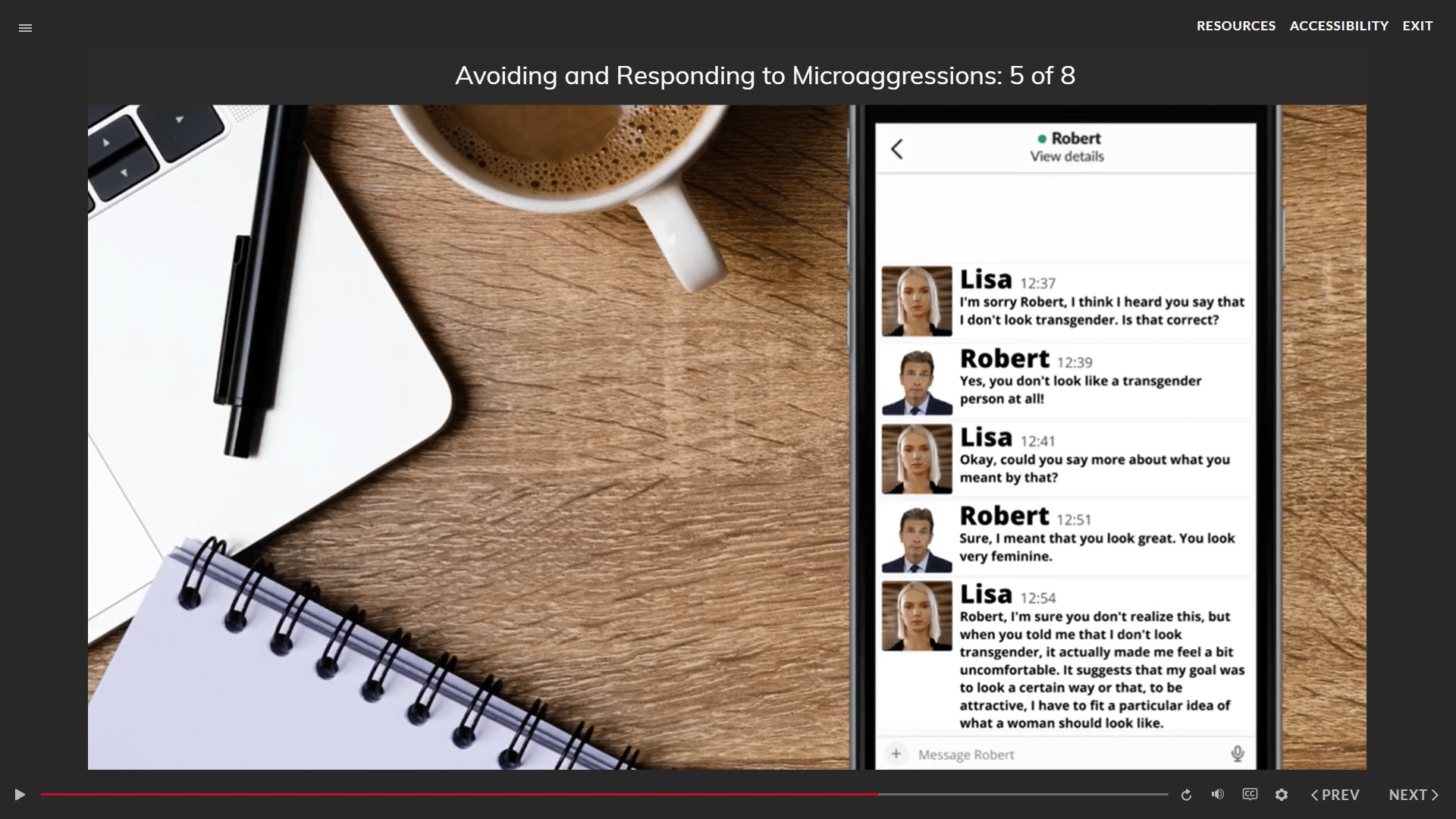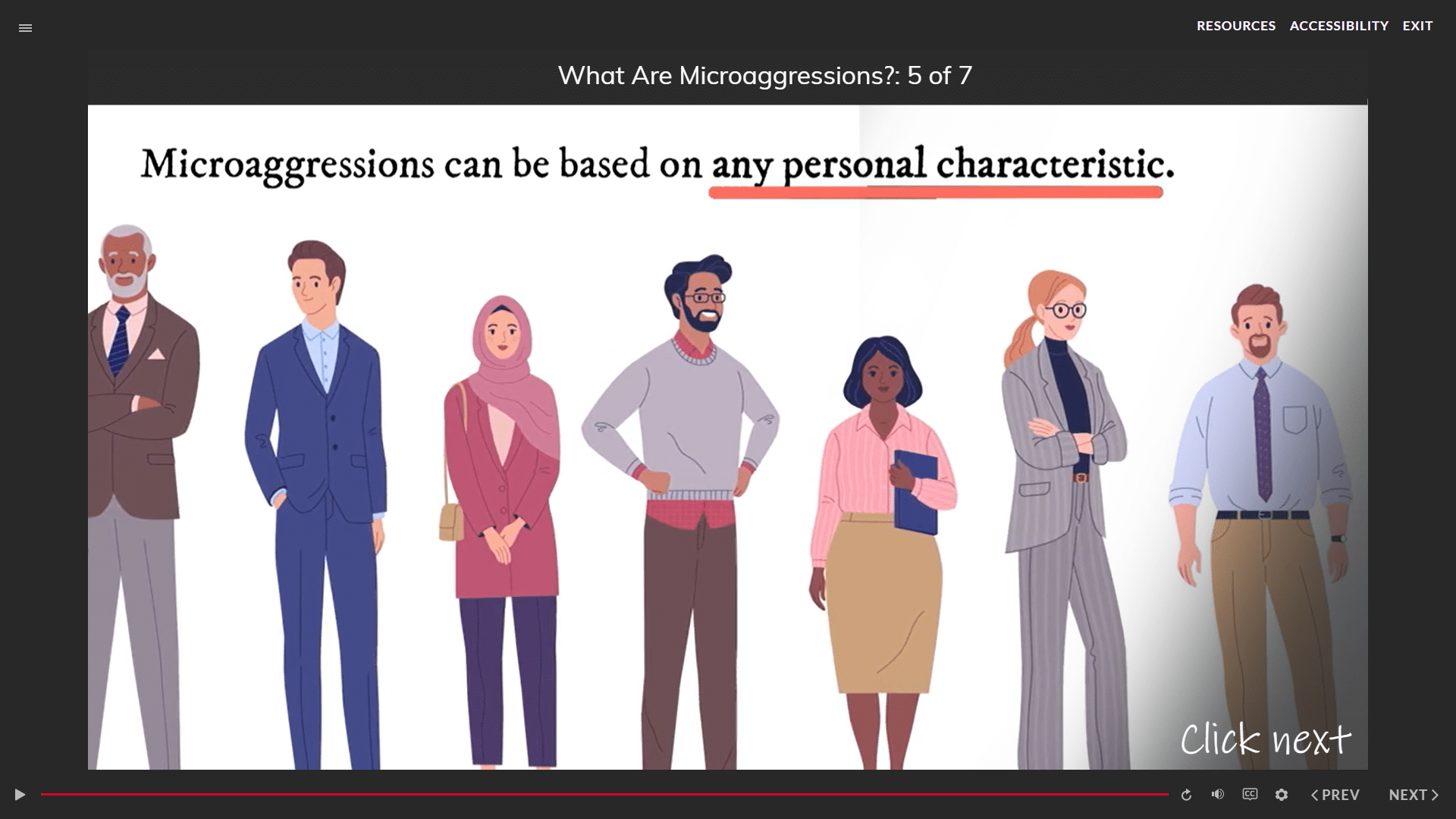
Microaggressions and Subtle Acts of Exclusion
Microaggressions harm workforce health, morale, and productivity. Help your employees choose the right behaviors and create a stronger workplace through mutual respect.
Course description
Traliant’s Microaggressions and Subtle Acts of Exclusion interactive online course helps learners understand how seemingly small comments or actions can have a negative impact on others and the workplace. This course explains what microaggressions are and the effect they can have on others, examines why certain remarks are considered microaggressions, and provides guidance for responding to microaggressions in a positive and effective manner.
ONLINE TRAINING
Microaggressions and Subtle Acts of Exclusion

This course covers these topics and more:
- What are Microaggressions
- Definition of Microaggressions
- Effects of Microaggressions
- Examples of Microaggressions
- Gender Identity
- Race
- National Origin
- Disability
- Age
- Religion
- Gender
- Avoiding and Responding to Microaggressions
- Implicit Bias
- Avoiding Microaggressions
- If you experience a Microaggression
- If you commit a Microaggression
THE TRALIANT DIFFERENCE
Compliance you can trust.
Training you will love.

Legal expertise
Our in-house legal team monitors the latest laws, rules and regulations, so you don't have to. You can rest assured that our courses are continuously compliant.

Brilliant training
With cinematic-quality videos produced by our Hollywood-based team, your employees will love our customizable, interactive, story-based training.

Valued partnership
Our main focus? It’s all about making your job easier. We do that with unmatched responsiveness and seamless deployment, dedicated to driving your success.

Meaningful impact
We don’t just deliver brilliant training, we help you create meaningful impact by broadening your employees' perspectives, achieving compliance and elevating culture.
KEY FEATURES
Why you'll love our training
It’s time to embrace a new era of online training with a valued partner who will ensure seamless implementation to fit your exact, a truly enjoyable learning experience and courses with continuous compliance you can trust.
Compliance expertise
Traliant's in-hour legal expertise ensures training is accurate and kept up-to-date with any regulatory changes.
Accessible to users with disabilities
Traliant provides an inclusive experience for all users, including those with disabilities, by going beyond Section 508-C standards and offering WCAG 2.1 AA.
Story-based learning
Our story-based approach blends leading instructional design with Hollywood talent to produce engaging, interactive and nuanced training.
Course administration
Traliant makes it simple to roll out training to your workplace and provide technical support directly to your employees at no additional cost.
Course customizations
Tailor courses to include your logo, relevant policies, workplace images, and more. Traliant can even customize the course with scenarios that take place in your own workplace environment.
Translations
Training is available in English, Spanish and is supported in over 100 languages.
COMPLIANCE EXPERTISE
Your partner in training compliance

Uniquely qualified in-house compliance team
Our exceptional in-house Compliance Advisory Team is led by Michael Johnson, Chief Strategy Officer and former U.S. Department of Justice attorney who has provided training and guidance to organizations like the Equal Employment Opportunity Commission, Google, the United Nations, and the World Bank.

Keeping you compliant, effortlessly
Keeping up with the complex web of employment laws — especially if your workforce spans multiple states — can be tricky. That’s why we offer a streamlined training solution that ensures you stay compliant with federal, state, and local regulations, so you can focus on what matters most: your team.

Simplifying your policies and handbooks
Crafting an employee handbook that meets legal standards can be daunting. Let us ease the burden. We help you navigate regulatory changes to ensure your policies and handbooks not only comply with the law but also reflect industry best practices.
What to consider when choosing the most effective microaggressions training

- Making assumptions about a person's skills or abilities based on their race, gender, or other characteristics.
- Commenting on a person's accent or appearance in a way that is demeaning or insensitive.
- Treating a person differently based on their race, gender, or other characteristics.
- Invalidating someone's experiences or feelings.
Read Traliant’s article to learn more about how to take action to recognize and respond to workplace microaggressions.








